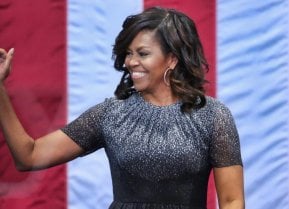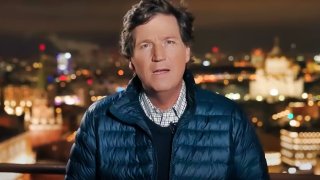Tucker Carlson's Putin Interview Was No Softball Chat
Reflecting on the interview from his hotel room afterward, Carlson refuted critics who have attacked him for giving Putin a platform.
Vladimir Putin said Russia’s war with Ukraine could be “over within a few weeks” if the United States stopped supplying weapons. Until that happens, however, the Russian leader vowed to continue fighting, bluntly telling Tucker Carlson, “We haven’t achieved our aims yet.”
The war, which began in 2014 and escalated with Russia’s invasion in 2022, is currently at a stalemate despite more than $113 billion in U.S. funding and additional aid to Ukraine from its European neighbors. An estimated 500,000 people have died or been injured since 2022, according to news reports.
During the past two years of fighting, Putin acknowledged he hasn’t spoken to President Joe Biden, although the Russian leader said he would entertain peace talks today.
“Don’t you have anything better to do?” Putin asked rhetorically. “You have issues on the border, issues with migration, issues with the national debt—more than $33 trillion. You have nothing better to do, so you should fight in Ukraine. Wouldn’t it be better to negotiate with Russia? Make an agreement.”
The two-hour interview with Tucker Carlson, recorded Tuesday at the Kremlin in Moscow, was the first between the Russian leader and an American journalist since the conflict in Ukraine escalated in 2022.
In a 10-minute post-interview video shared with paid subscribers of the Tucker Carlson Network, the fabled journalist said he was annoyed that Putin began the interview by “filibustering” with a long and complex history of Russia and Ukraine. For nearly an hour, Carlson diligently listened, occasionally getting needled by Putin for interrupting with questions.
“I understand that my long speeches probably fall outside of the genre of the interview,” Putin told Carlson. “That is why I asked you at the beginning, are we going to have a serious talk or a show? You said a serious talk. So bear with me, please.”
Carlson’s Take
In his post-interview video, Carlson noted that “Putin is not someone who does a lot of interviews.” In fact, his last interview with an American journalist came in October 2021, when he spoke with CNBC’s Hadley Gamble at an energy event in Moscow.
“He’s not good at explaining himself,” Carlson observed. “He’s smart, there’s no question about that. But he’s clearly spending a lot of time in a world where he doesn’t have to explain himself.”
Carlson concluded, “He didn’t lay out his case very coherently.”
Reflecting on Putin’s answers, Carlson noted that the Russian leader became animated when discussing the United States and the West’s approach toward his country.
“He’s very wounded by the rejection of the West,” Carlson said. “The U.S. government doesn’t like Russia. And like a lot of Russians, he expected the end of the Cold War would be Russia’s invitation into Europe.”
Yet despite this tension, Carlson said it was “striking” that Putin admitted he wanted a peace deal.
“Maybe he’s lying in ways I didn’t perceive, but he kept saying it. I don’t know why he would say it if he didn’t mean it,” Carlson said.
During the interview, Putin accused former British Prime Minister Boris Johnson of scuttling previous negotiations, “saying it was better to fight Russia.”
Russia’s Aims
Russia’s invasion of Ukraine in February 2022 prompted worldwide condemnation, yet Putin brashly accused Ukraine of starting the war in 2014 and claimed Russia was attempting to stop it.
Asked by Carlson if Russia had achieved its aims, Putin said, “No. We haven’t achieved our aims yet because one of them is denazification. This means the prohibition of all kinds of neo-Nazi movements.”
The Russian leader then turned his ire on the United States, saving some of his harshest criticism for Biden.
“I talked to him before the special military operation,” Putin told Carlson. “And I said to him then, by the way, I will not go into details, I never do. But I said to him then, ‘I believe that you are making a huge mistake of historic proportions by supporting everything that is happening there, in Ukraine, by pushing Russia away.’”
Carlson pressed Putin on why he wouldn’t call Biden today.
“If you really want to stop fighting, you need to stop supplying weapons,” Putin replied. “It will be over within a few weeks. That’s it. And then we can agree on some terms before you do that, stop. What’s easier? Why would I call him? What should I talk to him about? Or beg him for what?”
The conversation about Ukraine dominated the two-hour interview, including a revelation that Putin suspects the CIA is responsible for the Nord Stream pipeline attack in 2022. Putin also praised his “friend” Xi Jinping of China, and boasted about the growing cooperation between the two countries.
Confrontational Questions
Near the end of the interview, Carlson confronted Putin over Russia’s detainment of Wall Street Journal reporter Evan Gershkovich, who is being held on charges of espionage.
“It’s not my business, but what makes this different is the guy’s obviously not a spy. He’s a kid, and maybe he was breaking your law in some way, but he’s not a super spy and everybody knows that,” Carlson said pointedly.
Gershkovich has denied wrongdoing, although Putin suggested he broke the law by obtaining classified information. Putin indicated that continued U.S.-Russia talks would eventually lead to his release.
“I do not rule out that the person you refer to, Mr. Gershkovich, may return to his motherland,” Putin said. “But at the end of the day, it does not make any sense to keep him in prison in Russia.”
Reflecting on the interview from his hotel room afterward, Carlson refuted critics who have attacked him for giving Putin a platform.
“I’m from La Jolla, California, I’m not flacking for Putin,” Carlson said. “Please.”
Rob Bluey is Vice President for Communications and the Executive Editor for The Daily Signal.
This article was first published by The Daily Signal.


